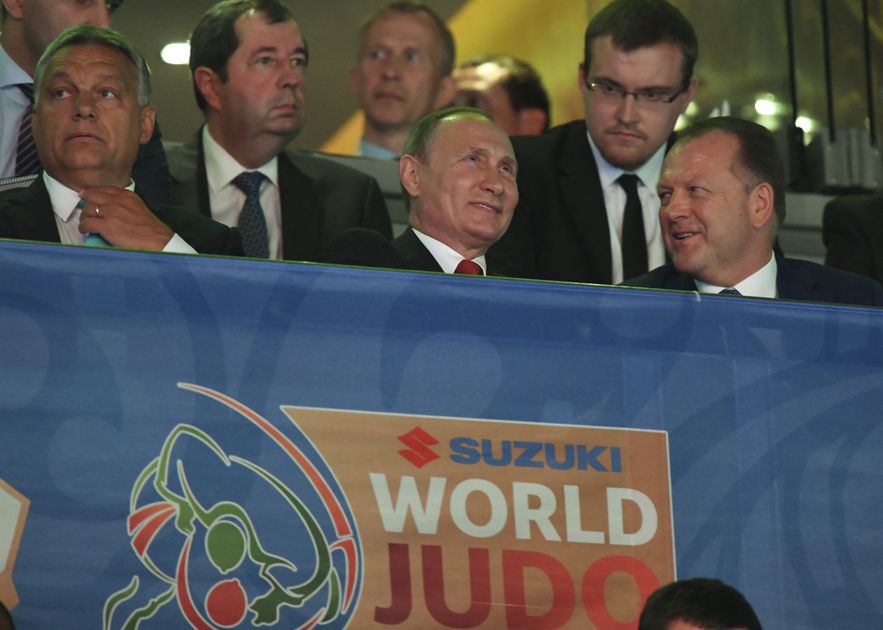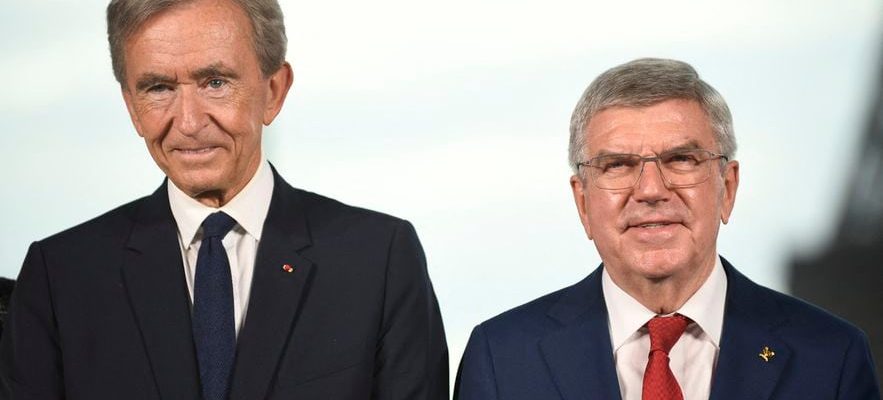In poker, we call it going all-in. Bet it all on one shot. Emmanuel Macron placed Olympic Games at the heart of his five-year term. “The climax of his mandate”, “an event which will place the country at the center of the world for two months”, “the most beautiful Games in history”, “an event worthy of the Universal Exhibition of 1889”, boast his advisors. The risk is calculated, no doubt, but the outcome can only be radical. Consecration or disaster, no half-measures possible. The lights are orange today. Public transport works poorly, private security companies are struggling to recruit, small grains of salt constantly hamper the dynamic, like this wooden tower of scandal in Tahiti. Nothing unusual. Will France succeed in its challenge of making its Olympic Games an unforgettable moment? Story of an event, bigger than a simple sporting competition.
EPISODE 1 – How Paris won the 2024 Olympics: bluff, shenanigans and small arrangements
EPISODE 2 – Paris 2024, the three plagues of the Olympics: metro, swimming pool and… these millions who intrigue the justice system
EPISODE 3 – Paris 2024, behind the scenes of the opening ceremony: security anxiety and political battle
Chapter 10: LVMH’s sponsorship and all-round partnerships
As usual, the fine sleuths of rue Cambon did not go into lyricism. The tone is dry, the subject dry. This July 1, 2023, the Court of Auditors publishes a new progress update on the organization of the Olympic and Paralympic Games. Throughout the 111 pages of the report, one sentence raises eyebrows: “The objective set in the budgetary revision imperatively assumes, to be achieved, that a new tier 1 partnership materializes.” Understand, the race for sponsors is not over. In the initial budget, Cojop set a target of 1.1 billion euros in sponsorship revenue, but the drift in expenses forced the organizers to raise the target to 1.24 billion euros. For weeks, a question has been tormenting the financiers of Paris 2024: when will the global luxury giant LVMH join the very select club of premium official partners, those who have paid a donation of nearly 150 million euros? The BPCE bank was the first, quickly followed by Orange. EDF took almost a year and a half to sign the contract.
Bernard Arnault, the boss of LVMH and Thomas Bach, the president of the IOC during the signing of the partnership with Paris 2024.
© / JULIEN DE ROSA / AFP
At the start of summer 2023, Bernard Arnault lets himself be desired. Within Paris 2024, one man is in charge: François-Xavier Bonnaillie, the big man of partnerships. Sport isn’t really his business. He spent twenty-five years at Procter & Gamble, and he knows how to do big deals. Except that there, he hooked too big a fish. Bernard Arnault, the richest man in the world, speaks directly with the IOC. A few months earlier, on December 17, 2022, the boss of LVMH discreetly received Thomas Bach, the president of the IOC, and a delegation from Cojop at the Louis-Vuitton Foundation. Amid the bronzes of Giacometti and the large formats of Joan Mitchell, they agreed on the principle of a partnership with Paris 2024. For the details, the stewardship will follow, and the contract is only definitively signed on July 24.
Berluti, Sephora, Chaumet, Dior, Vuitton.
“Everything took a long time, because LVMH went into a very fine level of detail,” comments François-Xavier Bonnaillie soberly. The luxury giant first negotiated an international extension of its rights. In principle, this type of partnership – even premium – only authorizes the company to use the Paris 2024 emblem within French borders. There, LVMH obtained the possibility of using the logo of the Paris Games in four or five other countries, in return for an extension to the IOC and the Olympic Committees of the countries concerned. The negotiation then concerns the houses featured. Who will dress the athletes on the evening of the ceremony? Givenchy ? Too complicated. Patoo? Too small. Kenzo, Fendi, Loro Piana? Too Italian. It will ultimately be the Franco-Italian brand Berluti, of which Antoine Arnault was the director at the time.
But the partnership with LVMH does not stop there. The jeweler Chaumet will design the medals, and Moët Hennessy champagnes will be served at all the tables of the official festivities. The Sephora brand will be visible throughout the flame’s journey. A collaboration with Dior will also be announced before the end of April. The highlight of the contract remains: a partnership with Louis Vuitton which will be revealed a few days before the start of the Games. Why not a trunk containing the medals and visible during each award ceremony to billions of spectators? After all, the Golden Ball which rewards the best European footballer of the season has since this year been transported in a trunk created by the French trunk maker.
Chapter 11: When Vladimir Putin bends the IOC

Russian President Vladimir Putin, with Hungarian Prime Minister Viktor Orban and Marius Vizer, the president of the International Judo Federation during the world championships in August 2017.
/ © ATTILA KISBENEDEK / AFP
This Friday, December 8, in Amélie Oudéa-Castéra’s office on the top floor of the Ministry of Sports, Matvi Bidny navigates between bitterness and anger. A few hours earlier, during an extraordinary conclave, the IOC finally decided in favor of the participation of Russian and Belarusian athletes in the Paris Games under a neutral banner. The new Ukrainian Minister of Sports visiting the capital blames the blow. For weeks, kyiv and its diplomacy tried to convince the major international sports federations and met certain influential members of the Lausanne organization. And then the scales tipped the other way. “We made this decision by accepting its consequences, and boycotts have never helped anything,” Baron Pierre-Olivier Beckers-Vieujant, one of the influential members of the Olympic movement, explained to L’Express a few days later.
The IOC has imposed safeguards: no team sport, and the CVs of future qualifiers will be scrutinized. They must never have demonstrated their support for the war, nor attended an army club. A half-victory for Vladimir Putin, who however threatens: “If international sports leaders continue to act in this way, they will bury the Olympic movement.” At the Elysée, Macron procrastinates and agrees with the opinion of the IOC. Anne Hidalgo maintains to L’Express that “the participation of the Russians is unthinkable”.
The day after the Russian invasion of Ukraine, on February 27, 2022, the Olympic movement advised international federations to exclude Russian athletes from their competitions. Then, a year ago, a breach opened, until the recent decision. But it is the international federations which will have the last word, since they are the ones who are responsible for organizing the qualifications.
In these high sporting spheres, performance matters as much as geopolitics. And the money. The very powerful international athletics federation, World Athletics, chaired by former 1,500 meter champion Sebastian Coe, has clearly banned all Russian athletes from qualifying competitions. Those of horse riding and surfing could follow.
But others, for years under Russian influence, welcome the IOC’s change of direction. The Russian-Uzbek oligarch Alisher Ousmanov, under sanctions from the European Union, has certainly resigned from the presidency of the fencing federation, but his shadow still hangs over the decisions. The Serbian president of the international wrestling federation (United World Wrestling), Nenad Lalovic, devotes eternal gratitude to Vladimir Putin, who supported him personally when the discipline almost disappeared from the list of Olympic sports ago a few years. As for Marius Vizer, the head of the International Judo Federation (IFJ), he has never hidden his friendship for the master of the Kremlin, with whom he hunts. The IJF is the only sports organization to have never excluded Russian athletes from its competitions. And, during the last World Championships in June 2023 in Qatar, Vladimir Putin largely welcomed the retrospective decision of the Federation to share the gold medal for a time granted to the Frenchman Teddy Riner with his opponent, the Russian Inal Tasoev…
It remains to be seen how many Russian athletes will participate in competitions this summer, given the very strict rules imposed by the IOC. Around forty at best, according to some observers. A delegation so thin that Moscow could well decide to boycott the Paris Games. After all, Putin will be able to parade during the World Friendship Games, a sort of competitor to the Olympics, organized in September in Moscow and Yekaterinburg in Siberia…
Chapter 12: Macron and the race for medals
Easy to annoy a French athlete. Just talk to him about “home advantage”, this theorem which would suggest that at each edition of the Games, the athletes from the host country outperform. A principle which suggests that medals could be obtained mechanically, without the effort of the champions. In a study, the National Sports Agency predicted 61 charms for France, including 17 in gold. This would be an absolute record, shattering the 53 medals from Rio in 2016. The very serious Gracenote institute is even more optimistic. On the basis of this same “home advantage”, calculated from the London Olympics, the institute predicts 51 tricolor medals including… 27 in gold. Which would place France on the podium of nations.
Emmanuel Macron has a goal: he asked athletes to aim for the top 5 in the world. A challenge. The day after the Tokyo Games, the president-coach did not hide his disappointment. “The overall results of these Games are not quite at the level we expected […] I tell you very clearly, we must do much more,” he grumbled in front of the federations, meeting at the Elysée in September 2021.
Before 2012, the British had chosen to focus on certain disciplines, through their UK Sport agency. For seven years, astronomical sums were spent on track cycling, rowing, canoeing, horse riding and sailing. On arrival, 65 medals, including 29 gold. A triumph. France did it differently. The National Sports Agency did not work by sectors but by potential. 120 million euros were invested in high performance. “We didn’t choose sports, we stayed a little in the middle, we lost time… However, for the festival to succeed, it will take good organization, popular success, but also good sporting results”, says Jean-François Lamour, former Minister of Sports and double gold medalist in saber. A fairer choice, more French no doubt. But risky, confronted with the glorious uncertainty of sport and those few thousandths of a second which separate happiness from dismay.
.
